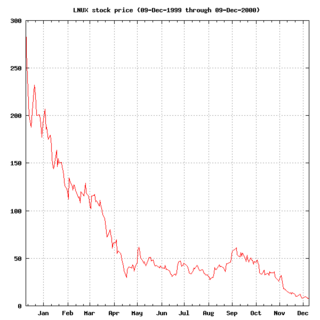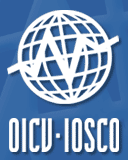
A commodity market is a market that trades in the primary economic sector rather than manufactured products, such as cocoa, fruit and sugar. Hard commodities are mined, such as gold and oil. Futures contracts are the oldest way of investing in commodities. Commodity markets can include physical trading and derivatives trading using spot prices, forwards, futures, and options on futures. Farmers have used a simple form of derivative trading in the commodity market for centuries for price risk management.

The Commodity Futures Trading Commission (CFTC) is an independent agency of the US government created in 1974 that regulates the U.S. derivatives markets, which includes futures, swaps, and certain kinds of options.

The Commodity Futures Modernization Act of 2000 (CFMA) is United States federal legislation that ensured financial products known as over-the-counter (OTC) derivatives remained unregulated. It was signed into law on December 21, 2000 by President Bill Clinton. It clarified the law so most OTC derivative transactions between "sophisticated parties" would not be regulated as "futures" under the Commodity Exchange Act of 1936 (CEA) or as "securities" under the federal securities laws. Instead, the major dealers of those products would continue to have their dealings in OTC derivatives supervised by their federal regulators under general "safety and soundness" standards. The Commodity Futures Trading Commission's (CFTC) desire to have "functional regulation" of the market was also rejected. Instead, the CFTC would continue to do "entity-based supervision of OTC derivatives dealers". The CFMA's treatment of OTC derivatives such as credit default swaps has become controversial, as those derivatives played a major role in the financial crisis of 2008 and the subsequent 2008–2012 global recession.

In finance, market data is price and other related data for a financial instrument reported by a trading venue such as a stock exchange. Market data allows traders and investors to know the latest price and see historical trends for instruments such as equities, fixed-income products, derivatives, and currencies.
Foreign exchange fraud is any trading scheme used to defraud traders by convincing them that they can expect to gain a high profit by trading in the foreign exchange market. Currency trading became a common form of fraud in early 2008, according to Michael Dunn of the U.S. Commodity Futures Trading Commission.

The International Organization of Securities Commissions (IOSCO) is an association of organizations that regulate the world's securities and futures markets. Members are typically primary securities and/or futures regulators in a national jurisdiction or the main financial regulator from each country. Its mandate is to:

Options Clearing Corporation (OCC) is a United States clearing house based in Chicago. It specializes in equity derivatives clearing, providing central counterparty (CCP) clearing and settlement services to 16 exchanges. It was started by Wayne Luthringshausen and carried on by Michael Cahill. Its instruments include options, financial and commodity futures, security futures, and securities lending transactions.
A commodity broker is a firm or an individual who executes orders to buy or sell commodity contracts on behalf of the clients and charges them a commission. A firm or individual who trades for his own account is called a trader. Commodity contracts include futures, options, and similar financial derivatives. Clients who trade commodity contracts are either hedgers using the derivatives markets to manage risk, or speculators who are willing to assume that risk from hedgers in hopes of a profit.
The Foreign Exchange Dealers Coalition (FXDC) was an alliance of the largest U.S. foreign exchange market dealers, that appears to have closed sometime after 2010. The FXDC partnership was formed in the fall of 2007 to pool industry resources to demonstrate the viability of the forex industry and to ensure fair regulation and oversight that does not hamper freedom of choice, innovation or job creation. The Coalition aimed to provide input to the proposals for major regulation changes at the time, including the required registration for Retail Foreign Exchange Dealers (RFEDs) with the National Futures Association.
Retail foreign exchange trading is a small segment of the larger foreign exchange market where individuals speculate on the exchange rate between different currencies. This segment has developed with the advent of dedicated electronic trading platforms and the internet, which allows individuals to access the global currency markets. As of 2016, it was reported that retail foreign exchange trading represented 5.5% of the whole foreign exchange market.
Foreign exchange regulation is a form of financial regulation specifically aimed at the Forex market that is decentralized and operates with no central exchange or clearing house. Due to its decentralized and global nature, the foreign exchange market has been more prone to foreign exchange fraud and has been less regulated than other financial markets.
A Swap Execution Facility (SEF) is a platform for financial swap trading that provides pre-trade information and a mechanism for executing swap transactions among eligible participants.
A Commodity pool operator (CPO) is an individual or organization that solicits or receives funds to use in the operation of a commodity pool, syndicate, investment trust, or other similar fund, specifically for trading in commodity interests. Such interests include commodity futures, swaps, options and/or leverage transactions. A commodity pool may refer to funds that trade in commodities and can include hedge funds. A CPO may make trading decisions for a fund or the fund can be managed by one or more independent commodity trading advisors. The definition of CPO may apply to investment advisors for hedge funds and private funds including mutual funds and exchange-traded funds in certain cases. CPOs are generally regulated by the United States federal government through the Commodity Futures Trading Commission and National Futures Association.
A commodity trading advisor (CTA) is US financial regulatory term for an individual or organization who is retained by a fund or individual client to provide advice and services related to trading in futures contracts, commodity options and/or swaps. They are responsible for the trading within managed futures accounts. The definition of CTA may also apply to investment advisors for hedge funds and private funds including mutual funds and exchange-traded funds in certain cases. CTAs are generally regulated by the United States federal government through registration with the Commodity Futures Trading Commission (CFTC) and membership of the National Futures Association (NFA).
A managed futures account (MFA) or managed futures fund (MFF) is a type of alternative investment in the US in which trading in the futures markets is managed by another person or entity, rather than the fund's owner. Managed futures accounts include, but are not limited to, commodity pools. These funds are operated by commodity trading advisors (CTAs) or commodity pool operators (CPOs), who are generally regulated in the United States by the Commodity Futures Trading Commission and the National Futures Association. As of June 2016, the assets under management held by managed futures accounts totaled $340 billion.
ICE Clear Credit LLC, a Delaware limited liability company, is a Derivatives Clearing Organisation (DCO) previously known as ICE Trust US LLC which was launched in March 2009. ICE offers trade execution and processing for the credit derivatives markets through Creditex and clearing through ICE Trust™. ICE Clear Credit LLC operates as a central counterparty (CCP) and clearinghouse for credit default swap (CDS) transactions conducted by its participants. ICE Clear Credit LLC is a subsidiary of IntercontinentalExchange (ICE). ICE Clear Credit LLC is a wholly owned subsidiary of ICE US Holding Company LP which is "organized under the law of the Cayman Islands but has consented to the jurisdiction of United States courts and government agencies with respect to matters arising out of federal banking laws."

Securities market participants in the United States include corporations and governments issuing securities, persons and corporations buying and selling a security, the broker-dealers and exchanges which facilitate such trading, banks which safe keep assets, and regulators who monitor the markets' activities. Investors buy and sell through broker-dealers and have their assets retained by either their executing broker-dealer, a custodian bank or a prime broker. These transactions take place in the environment of equity and equity options exchanges, regulated by the U.S. Securities and Exchange Commission (SEC), or derivative exchanges, regulated by the Commodity Futures Trading Commission (CFTC). For transactions involving stocks and bonds, transfer agents assure that the ownership in each transaction is properly assigned to and held on behalf of each investor.

The Commodity Futures Trading Commission's Whistleblower Program was created with the 2010 passage of the Dodd-Frank Act. The program rewards individuals who report possible Commodity Exchange Act (CEA) violations. The program also extends anti-retaliation protections for whistleblowers who file claims.
The Global Association of Central Counterparties or CCP Global, formerly CCP12, is the trade association of central counterparty clearinghouses (CCPs) located in Amsterdam in the Netherlands, and China. It represents 39 primary members, and 3 observer members of CCPs operating across Africa, the Americas, Asia, Australia and Europe and representing over 60 individual CCPs. CCP12 was formed in 2001 by major central counterparty organizations in Europe, Asia and the Americas to share CCP related information and to develop analyses and policy standards for common areas of concern.







